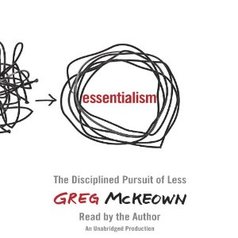 Facebook, Linkedin, Twitter, open space offices, blogs, newsletters, email chains, reply all emails, outlook calendars full of meetings, double and triple booked hours of the day, back to back recurring conference calls starting form 6:00 am to talk to your team in Europe and finishing at 8:00 pm with calls with your Asia-Pacific counterparts. It never stops! Someone or something would want to claim one more minute out of your day, while adding lines to your never-ending to-do list. Honestly, now that I think about them, 99% are non essential to my success at work and happiness at life! This was my first reaction when I finished listening to Essentialism by Greg Mckeown. My 2nd thought after finishing this book was that I need to share it with 10 people I know who are truly non-essentialists. It has the potential to change their lives and careers alike. But, I thought I don't want to call one of my friends and say: "hey, I think you are a non-essentialist, sooooo please read this book". Even if I don't say it, after going through the first chapter they would know why I gave them the book... Instead, before I get to my thoughts about the "Essentialist Strategy", if you are interested to learn about the path of an essentialist, let me know in the comment section and I will personally buy you a copy. This is my altruistic side that gets excited about new thoughts and ideas and loves to share it with the world. I hope at least 10 of you take me up on this offer! Now, let's go back to my less altruistic side and more career-focused thoughts and reactions to the book. Greg defines essentialism as "the disciplined pursuit of less". Similarly, by design, strategic planning is the practice of identifying what is absolutely essential for the company and then keeping the company focused on that direction. The goal of a strategic plan is to maintain company's resources focused on the company's priority. After reading Greg's book, I believe Essentialism is the only practice a company must adhere to in order to execute on its strategy and maintain its focus. I'd like to call it an "Essentialist Strategy".
In the book, Greg talks about different techniques to pursue the path of an essentialist. Among all, the one that is mostly relevant to an essentialist strategy, is the process of identifying what not to do. What the company should not do is usually unidentified and is the cause of too many miserable failures in the realm of strategic planning. In most companies who fail to execute on their strategy, three scenarios are shaped after the planning phase is over. All of which could be prevented if one follows an essentialist manner to the strategic planning process and add the "what not to do's" section to the plan. Here are the three scenarios:
P.S. Thank you to my good colleague and friend who recommended the Essentialist to me! I confess a lot of times I am a non essentialist and the book has triggered wonderful thoughts including this blog post! Thank you!
0 Comments
Leave a Reply. |
© COPYRIGHT 2015 - 2023. ALL RIGHTS RESERVED.